Overview
Introduction: Can Dogs Eat Cucumbers Safely
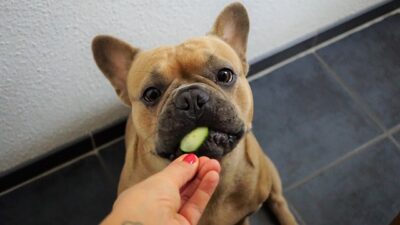
Cucumbers are a household staple, known for their crisp texture and refreshing taste. But can dogs eat them safely? In this guide, we’ll cover all you need to know about feeding cucumbers to your furry friends, from their popularity as a healthy human snack to the importance of knowing what’s safe for dogs.
Nutritional Value of Cucumbers for Dogs
Cucumbers are packed with essential vitamins and minerals, including vitamin K, vitamin C, and potassium, which can benefit your dog’s overall health. These nutrients make cucumbers a valuable addition to your dog’s diet.
Cucumbers are a low-calorie snack option that can help maintain your dog’s weight. This makes them an excellent choice for dogs that need to shed a few pounds or maintain a healthy weight.
Can Dogs Eat Cucumbers Raw?
Feeding your dog raw cucumbers is generally safe, but there are precautions to keep in mind. Ensure you wash cucumbers thoroughly to remove any pesticides or contaminants that may harm your dog.
When offering cucumbers to your dog, remember that moderation is key. Providing a few slices as an occasional treat is a safe way to incorporate this vegetable into their diet.
Cucumber Preparation Methods for Dogs
Slicing cucumbers into bite-sized pieces is the simplest way to prepare them for your dog. This method reduces the risk of choking and makes it easy for your furry friend to enjoy this healthy snack.
For a creative twist, you can blend cucumbers into homemade treats. Just ensure that the treat recipes you use are dog-friendly and avoid adding harmful ingredients like onions or garlic.
Dehydrated cucumber slices can serve as a crunchy, long-lasting snack for your dog. This method enhances the shelf life of cucumbers while preserving their nutritional value.
Health Benefits of Cucumbers for Dogs
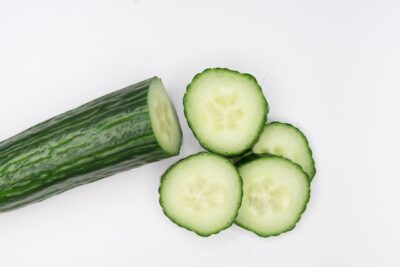
Cucumbers have a high water content, making them an excellent choice for keeping your dog hydrated, especially on hot summer days. Adequate hydration supports your dog’s overall health and well-being.
If your dog is struggling with weight management, cucumbers can be an essential addition to their diet. Their low-calorie nature helps reduce calorie intake, aiding in weight control.
Chewing on cucumber slices can improve your dog’s dental health by reducing plaque and freshening their breath. However, it’s essential to maintain regular dental care practices.
Potential Risks and Allergies
While cucumbers are generally safe for dogs, some may have allergies to this vegetable. Keep an eye on your pet for any signs of allergic reactions, such as itching, vomiting, or diarrhea.
Overfeeding cucumbers can lead to digestive issues, such as stomach upset or diarrhea. Ensure you provide cucumbers in moderation to avoid these problems.
Can Dogs Eat Pickles?
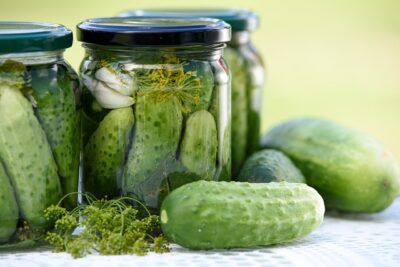
Pickle cucumbers, on the other hand, are not recommended for dogs. They often contain high levels of sodium and spices that can be harmful to your pet’s health.
When it comes to pickles, it’s not just the high salt content that’s problematic for dogs. Ingredients like garlic and onion, often found in pickles, are toxic to them.
Introducing Cucumbers to Your Dog’s Diet
When introducing cucumbers to your dog’s diet, do it gradually. Start with small portions to allow their digestive system to adjust to this new food.
Pay close attention to your dog’s reaction when introducing cucumbers. Look for any signs of discomfort or allergies and adjust their cucumber intake accordingly.
Cucumber Recipes for Dogs
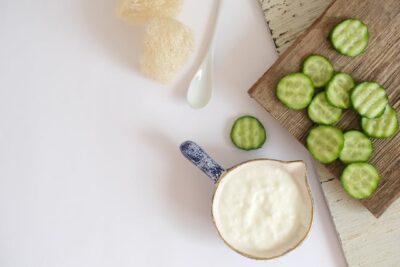
Get creative with cucumber-based dog treat recipes that your furry friend will love. Homemade treats are a great way to ensure the ingredients are safe for your dog.
Explore a wholesome cucumber and chicken meal recipe that’s both nutritious and delicious. Cooking for your dog allows you to control the ingredients and provide a well-balanced diet.
Alternatives to Cucumbers for Dogs
If your dog isn’t a fan of cucumbers or you’re looking for variety, consider other safe fruits and vegetables as healthy snack options.
Explore commercial dog treat options that incorporate the goodness of cucumbers. Many dog treat brands offer cucumber-flavored treats that are both safe and delicious.
Frequently Asked Questions (FAQs)
A. Can dogs eat cucumber seeds?
Cucumber seeds are generally safe for dogs to consume. However, it’s a good practice to remove them to prevent any potential choking hazards.
B. Are there any cucumber varieties to avoid?
While most cucumber varieties are safe for dogs, it’s essential to avoid bitter cucumbers, as they can cause digestive upset.
C. How should I store cucumbers for my dog?
Store cucumbers in a cool, dry place or in the refrigerator to keep them fresh for your dog. Ensure they are well-washed before serving.
D. Can cucumbers help with a dog’s bad breath?
Yes, chewing on cucumber slices can help freshen your dog’s breath naturally. It’s a healthy alternative to traditional breath fresheners.
E. Are there any situations where cucumbers should be avoided completely?
Cucumbers should be avoided if your dog has known allergies to them or if they experience digestive issues when consuming cucumbers.
Cucumbers and Your Dog’s Health
Cucumbers Contain All the Nutrients
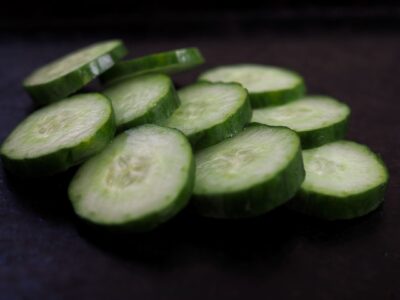
One of the remarkable aspects of cucumbers is that they contain a variety of nutrients that can contribute to your dog’s overall health. The vitamins and minerals, such as vitamin K and potassium, support your dog’s immune system and help maintain healthy red blood cells. These nutrients are essential for dogs of all sizes, whether you have a small dog or a robust German Shepherd.
For overweight dogs, finding healthy treats can be a challenge. Cucumbers come to the rescue as a low-calorie snack option. Incorporating cucumbers into their diet can aid in weight management, ensuring that your dog maintains a healthy weight and avoids the potential health issues associated with obesity.
Cucumbers can play a role in promoting a healthy digestive system for your dog. The fiber content in cucumbers supports regular bowel movements, preventing constipation. However, it’s important to maintain a balance and not overdo it, as too much cucumber can lead to upset stomach and diarrhea.
Cucumber Varieties and Safety Considerations
While most cucumber varieties are safe for dogs, it’s crucial to be aware of bitter cucumbers. These cucumbers can contain compounds that may cause digestive discomfort for your pet. To be on the safe side, opt for the sweeter cucumber varieties when sharing this refreshing treat with your dog.
Ensuring Cucumbers Are Prepared Properly

To make cucumbers safe for your dog, ensure they are prepared properly. Remove the cucumber’s skin, as it can be tough to digest for some dogs. Additionally, always wash cucumbers thoroughly to eliminate any potential pesticides or contaminants. These precautions ensure that the cucumbers you feed your dog are not only delicious but also safe.
Store-Bought Cucumber Water: A Hydrating Option
If you’re looking for an easy way to keep your dog hydrated, consider store-bought cucumber water. Some pet stores offer cucumber-infused water designed with dogs in mind. This refreshing option can be particularly beneficial on hot summer days when your dog needs extra hydration.
Exploring New Foods and Treats
Introducing new foods into your dog’s diet, like cucumbers, can be an exciting way to diversify their meals and treats. Experiment with different recipes and options to see what your dog enjoys the most. Whether it’s cucumber treats, slices, or blended snacks, the key is to provide variety while ensuring their safety and well-being.
Cucumbers: A Versatile Addition to Training Treats
When it comes to training your dog, positive reinforcement with treats is a popular method. Incorporating cucumber slices into your training regimen can be a healthy and effective way to reward your furry friend. The mild flavor and crisp texture of cucumbers make them a perfect incentive during training sessions.
During training, it’s essential to control the portion sizes of treats, including cucumbers, to ensure your dog doesn’t overindulge. A small piece of cucumber can be just as motivating as a larger treat, promoting your dog’s good behavior without excessive calorie intake.
If you have a diabetic dog, managing their diet is crucial. Cucumbers, being low in calories and carbohydrates, can be a suitable addition to their diet plan. However, always consult your veterinarian for personalized dietary recommendations tailored to your diabetic dog’s needs.
While cucumbers are generally safe for dogs, they can pose a choking hazard, particularly if not sliced into manageable pieces. To prevent choking incidents, always slice cucumbers into bite-sized portions that your dog can comfortably chew and swallow.
Get creative with cucumber treats by combining them with a dollop of cream cheese. Cream cheese adds flavor and creaminess to the crispness of cucumbers, creating a delicious and nutritious snack that your dog will adore.
Chewing on cucumber slices not only satisfies your dog’s taste buds but also promotes oral health. The act of chewing can help remove plaque buildup on their teeth, contributing to better dental hygiene. While cucumbers alone are not a replacement for regular dental care, they can be a tasty and healthy addition to your efforts to keep your dog’s teeth clean.
Peeling cucumbers before serving them to your dog is a safety precaution worth considering. The skin of cucumbers can be tough to digest for some dogs, and peeling removes this potential obstacle, making cucumbers even safer for consumption.
Training treats serve as rewards for good behavior and successful training sessions. Including cucumbers in your arsenal of training treats provides a healthy option that aligns with your dog’s well-being. It’s a win-win situation: your dog learns new tricks, and you reinforce those behaviors with a nutritious treat.
With these additional insights into the versatility and safety of cucumbers as a treat for your dog, you can confidently incorporate this vegetable into their diet and training routine. Remember that moderation is key, and always consider your dog’s individual preferences and dietary needs when offering cucumbers.
By being mindful of portion sizes, safety precautions, and your dog’s unique requirements, you can make cucumbers a delightful and healthy part of your pet’s life. Whether you have a pup just starting to explore the world of cucumbers or an adult dog enjoying the oral health benefits, cucumbers can be a tasty and nutritious addition to their diet.
Conclusion: Cucumbers – A Tasty and Beneficial Addition to Your Dog’s Diet
In summary, when it comes to the question of whether dogs can eat cucumbers, the answer is a resounding yes! Cucumbers offer a refreshing and nutritious option for your furry companions. Here’s a recap of what you need to know about dogs eating cucumbers:
- Balanced Nutrition: Cucumbers are a rich source of essential vitamins and minerals, such as vitamin K, vitamin C, and potassium, making them a valuable addition to your dog’s diet.
- Weight Management: If you’re concerned about your dog’s weight, cucumbers can be a fantastic choice. Their low-calorie nature allows your canine friend to enjoy a tasty treat without compromising their weight management goals.
- Hydration Boost: Cucumbers are particularly beneficial during hot weather, as their high water content helps keep your dog well-hydrated.
- Dental Health: Chewing on cucumber slices can aid in maintaining your dog’s oral health by reducing plaque buildup and refreshing their breath.
- Safe Preparation: To ensure your dog’s safety, remember to wash cucumbers thoroughly, remove the skin, and cut them into manageable portions to prevent choking hazards.
- Moderation is Key: Like any treat, moderation is essential. Avoid overfeeding cucumbers to prevent digestive issues.
- Avoid Pickles: While cucumbers are generally safe, pickled cucumbers, or pickles, should be avoided due to their high sodium and potentially harmful spices.
- Allergies and Individual Sensitivities: Keep an eye out for any signs of allergies or adverse reactions in your dog when introducing cucumbers into their diet. Every dog is unique, and some may have sensitivities.
- Variety and Creativity: Explore different ways to incorporate cucumbers into your dog’s diet, from simple slices to blended treats or even cucumber-infused water. It’s an excellent opportunity to provide variety while ensuring their well-being.
In conclusion, cucumbers are a nutritious and safe option for dogs when served responsibly. Whether you have a puppy just starting to explore the world of cucumbers or an adult dog enjoying the health benefits, cucumbers can be a tasty and beneficial addition to their meals and treats. So go ahead, and let your dog enjoy the crisp and refreshing taste of cucumbers as part of their balanced diet.




